The space race between Pakistan and India has been a topic of interest for many years. While India has made significant strides in its space program, Pakistan’s efforts have been more modest. However, the question remains: can Pakistan compete with India in the space race?
India’s Space Program
India’s space program, led by the Indian Space Research Organisation (ISRO), has achieved several milestones. ISRO has successfully launched various satellites, including the Chandrayaan missions to the Moon and the Mars Orbiter Mission. India’s space program has also focused on developing launch vehicles, such as the Polar Satellite Launch Vehicle (PSLV) and the Geosynchronous Satellite Launch Vehicle (GSLV). Additionally, India is working on its first human spaceflight mission, Gaganyaan, which aims to send Indian astronauts into space by 2026.
–Chandrayaan Missions: India’s Chandrayaan-1 was launched in 2008 and discovered water molecules on the Moon’s surface, a groundbreaking achievement. Chandrayaan-2, launched in 2019, aimed to explore the Moon’s south pole but faced a setback when the lander failed to make a soft landing. India is now preparing for Chandrayaan-3 to continue its lunar exploration.
–Mars Orbiter Mission (Mangalyaan): Launched in 2013, this mission made India the first country to successfully reach Mars on its first attempt. The mission was praised for its cost-effectiveness and has provided valuable data on Mars’ surface and atmosphere.
– Commercial Satellite Launches: ISRO has also become a prominent player in the global satellite launch market, launching satellites for various countries using its reliable PSLV. This has not only generated revenue but also established India’s reputation as a cost-effective and reliable launch service provider.
Pakistan’s Space Program
Pakistan’s space program, managed by the Space and Upper Atmosphere Research Commission (SUPARCO), has faced several challenges. SUPARCO was established in 1961, but its progress has been slower compared to India’s ISRO. Pakistan has launched a few satellites, including the Badr series and the Pakistan Remote Sensing Satellite (PRSS). However, the country’s space program has struggled with funding and technological advancements.
– Badr Satellites: The Badr series included Pakistan’s first indigenously developed satellite, Badr-1, launched in 1990. Badr-B followed in 2001, providing valuable data on weather patterns and communication.
– Pakistan Remote Sensing Satellite (PRSS): Launched in 2018, PRSS-1 is designed for remote sensing applications, including agriculture, disaster management, and urban planning. This satellite marked a significant step forward for Pakistan’s space capabilities.
Challenges and Opportunities
One of the main challenges for Pakistan’s space program is the lack of funding and resources. India’s space budget is significantly higher, allowing ISRO to undertake ambitious projects and develop advanced technologies. In contrast, Pakistan’s space budget is much smaller, limiting SUPARCO’s capabilities.
Despite these challenges, Pakistan has opportunities to improve its space program. Collaboration with other countries, such as China, could provide access to advanced technologies and expertise. Additionally, focusing on specific areas, such as satellite navigation and remote sensing, could help Pakistan make significant progress in its space program.
– International Collaboration: Working with space-faring nations like China and Russia could provide Pakistan with access to advanced technology, expertise, and training. Joint missions and technology transfers could accelerate SUPARCO’s progress.
– Focus on Niche Areas: By concentrating on specific fields like remote sensing, climate monitoring, and disaster management, Pakistan can develop specialized capabilities that complement global space efforts. This approach could also attract international partnerships and funding.
Conclusion
While Pakistan’s space program has made some progress, it still lags behind India’s achievements. However, with increased funding, international collaboration, and a focus on specific areas, Pakistan could improve its space capabilities and compete more effectively with India in the space race.
Discover more from Defence Talks | Defense News Hub, Military Updates, Security Insights
Subscribe to get the latest posts sent to your email.




